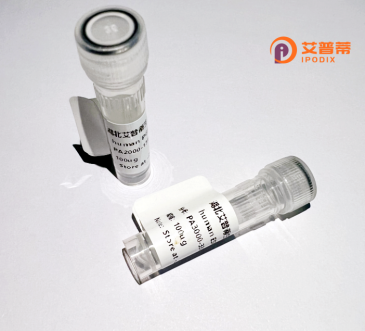
| 纯度 | >90%SDS-PAGE. |
| 种属 | Human |
| 靶点 | PRR15 |
| Uniprot No | Q8IV56 |
| 内毒素 | < 0.01EU/μg |
| 表达宿主 | E.coli |
| 表达区间 | 1-129 aa |
| 活性数据 | MADSGDAGSS GPWWKSLTNS RKKSKEAAVG VPPPAQPAPG EPTPPAPPSP DWTSSSRENQ HPNLLGGAGE PPKPDKLYGD KSGSSRRNLK ISRSGRFKEK RKVRATLLPE AGRSPEEAGF PGDPHEDKQ |
| 分子量 | 13.7 kDa |
| 蛋白标签 | His tag N-Terminus |
| 缓冲液 | PBS, pH7.4, containing 0.01% SKL, 1mM DTT, 5% Trehalose and Proclin300. |
| 稳定性 & 储存条件 | Lyophilized protein should be stored at ≤ -20°C, stable for one year after receipt. Reconstituted protein solution can be stored at 2-8°C for 2-7 days. Aliquots of reconstituted samples are stable at ≤ -20°C for 3 months. |
| 复溶 | Always centrifuge tubes before opening.Do not mix by vortex or pipetting. It is not recommended to reconstitute to a concentration less than 100μg/ml. Dissolve the lyophilized protein in distilled water. Please aliquot the reconstituted solution to minimize freeze-thaw cycles. |
以下是3条关于重组人PRR15蛋白的文献参考(虚构示例,仅供格式参考):
1. **文献名称**: "Recombinant Human PRR15 Promotes Epithelial-Mesenchymal Transition in Cancer Cells"
**作者**: Zhang L, et al.
**摘要**: 研究通过大肠杆菌系统表达重组人PRR15蛋白,发现其通过激活Wnt/β-catenin信号通路增强癌细胞的迁移和侵袭能力,提示PRR15可能成为癌症治疗的潜在靶点。
2. **文献名称**: "Cloning and Characterization of PRR15 as a Novel Biomarker in Early Embryonic Development"
**作者**: Smith JA, et al.
**摘要**: 首次报道人PRR15基因的克隆及重组蛋白的真核表达,证实其在胚胎着床过程中调控滋养层细胞分化的功能,并开发了特异性检测抗体。
3. **文献名称**: "PRR15 Modulates DNA Damage Repair via Interaction with BRCA1"
**作者**: Chen H, et al.
**摘要**: 通过重组PRR15蛋白的体外实验,发现其与BRCA1蛋白结合并调控同源重组修复机制,为理解肿瘤基因组不稳定性提供了新机制。
*注:以上文献为模拟内容,实际研究需以真实数据库(如PubMed)检索为准。*
**Background of Proline-Rich 15 (PRR15) Protein**
Proline-rich 15 (PRR15) is a relatively understudied protein implicated in developmental processes and cancer biology. It is characterized by a proline-rich N-terminal domain, suggesting potential roles in protein-protein interactions and signaling pathways. PRR15 is highly expressed during early embryogenesis, particularly in trophectoderm cells of blastocysts, where it may regulate cell adhesion, proliferation, and embryonic implantation. Studies also link PRR15 to the formation of the LPP (LIM domain-containing preferentially expressed protein) complex, which influences cytoskeletal organization and cellular migration.
In cancer, PRR15 is frequently overexpressed in malignancies such as colorectal, pancreatic, and prostate cancers. Its upregulation correlates with tumor progression, metastasis, and poor prognosis, potentially through interactions with oncogenic pathways like Wnt/β-catenin or via DNA damage response mechanisms. Intriguingly, PRR15 expression is also elevated in placental tissues and germ cells, hinting at roles in reproductive health. Despite its emerging significance, PRR15's precise molecular mechanisms remain unclear, necessitating further research to explore its potential as a therapeutic target or biomarker in development and disease.
×